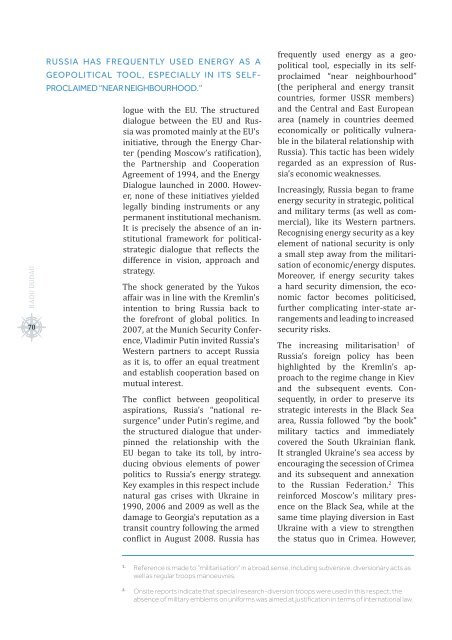You also want an ePaper? Increase the reach of your titles
YUMPU automatically turns print PDFs into web optimized ePapers that Google loves.
RADU DUDAU<br />
70<br />
RUSSIA HAS FREQUENTLY USED ENERGY AS A<br />
GEOPOLITICAL TOOL, ESPECIALLY IN ITS SELF-<br />
PROCLAIMED “NEAR NEIGHBOURHOOD.”<br />
logue with the EU. The structured<br />
dialogue between the EU and Russia<br />
was promoted mainly at the EU’s<br />
initiative, through the Energy Charter<br />
(pending Moscow’s ratification),<br />
the Partnership and Cooperation<br />
Agreement of 1994, and the Energy<br />
Dialogue launched in 2000. However,<br />
none of these initiatives yielded<br />
legally binding instruments or any<br />
permanent institutional mechanism.<br />
It is precisely the absence of an institutional<br />
framework for politicalstrategic<br />
dialogue that reflects the<br />
difference in vision, approach and<br />
strategy.<br />
The shock generated by the Yukos<br />
affair was in line with the Kremlin’s<br />
intention to bring Russia back to<br />
the forefront of global politics. In<br />
2007, at the Munich Security Conference,<br />
Vladimir Putin invited Russia’s<br />
Western partners to accept Russia<br />
as it is, to offer an equal treatment<br />
and establish cooperation based on<br />
mutual interest.<br />
The conflict between geopolitical<br />
aspirations, Russia’s “national resurgence”<br />
under Putin’s regime, and<br />
the structured dialogue that underpinned<br />
the relationship with the<br />
EU began to take its toll, by introducing<br />
obvious elements of power<br />
politics to Russia’s energy strategy.<br />
Key examples in this respect include<br />
natural gas crises with Ukraine in<br />
1990, 2006 and 2009 as well as the<br />
damage to Georgia’s reputation as a<br />
transit country following the armed<br />
conflict in August 20<strong>08</strong>. Russia has<br />
frequently used energy as a geopolitical<br />
tool, especially in its selfproclaimed<br />
“near neighbourhood”<br />
(the peripheral and energy transit<br />
countries, former USSR members)<br />
and the Central and East European<br />
area (namely in countries deemed<br />
economically or politically vulnerable<br />
in the bilateral relationship with<br />
Russia). This tactic has been widely<br />
regarded as an expression of Russia’s<br />
economic weaknesses.<br />
Increasingly, Russia began to frame<br />
energy security in strategic, political<br />
and military terms (as well as commercial),<br />
like its Western partners.<br />
Recognising energy security as a key<br />
element of national security is only<br />
a small step away from the militarisation<br />
of economic/energy disputes.<br />
Moreover, if energy security takes<br />
a hard security dimension, the economic<br />
factor becomes politicised,<br />
further complicating inter-state arrangements<br />
and leading to increased<br />
security risks.<br />
The increasing militarisation 1 of<br />
Russia’s foreign policy has been<br />
highlighted by the Kremlin’s approach<br />
to the regime change in Kiev<br />
and the subsequent events. Consequently,<br />
in order to preserve its<br />
strategic interests in the Black Sea<br />
area, Russia followed “by the book”<br />
military tactics and immediately<br />
covered the South Ukrainian flank.<br />
It strangled Ukraine’s sea access by<br />
encouraging the secession of Crimea<br />
and its subsequent and annexation<br />
to the Russian Federation. 2 This<br />
reinforced Moscow’s military presence<br />
on the Black Sea, while at the<br />
same time playing diversion in East<br />
Ukraine with a view to strengthen<br />
the status quo in Crimea. However,<br />
1.<br />
Reference is made to “militarisation” in a broad sense, including subversive, diversionary acts as<br />
well as regular troops manoeuvres.<br />
2.<br />
Onsite reports indicate that special research-diversion troops were used in this respect; the<br />
absence of military emblems on uniforms was aimed at justification in terms of international law.










